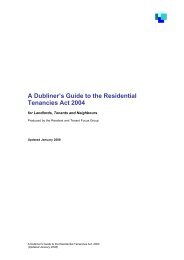work from home scams - Dublin.ie
work from home scams - Dublin.ie
work from home scams - Dublin.ie
You also want an ePaper? Increase the reach of your titles
YUMPU automatically turns print PDFs into web optimized ePapers that Google loves.
* DON’T BE FOOLED *<br />
Work From Home Scams<br />
NATIONAL CONSUMER AGENCY URGES CONSUMERS TO BE WARY OF<br />
WORK‐FROM‐HOME SCAMS<br />
Tuesday, 31 st March – This April fools day, the NCA is urging consumers to be<br />
especially wary of <strong>work</strong>‐<strong>from</strong>‐<strong>home</strong> <strong>scams</strong> which are likely to become more<br />
prevalent with unemployment rates on the rise and many people looking for ways to<br />
make money during the economic downturn.<br />
Ann Fitzgerald, Ch<strong>ie</strong>f Executive of the NCA said, “Scam artists are ruthless and see<br />
the recession as a way to capitalise on people in a vulnerable position. They spot the<br />
trends early making their <strong>scams</strong> seem as authentic as possible and in doing so exploit<br />
others recklessly.<br />
“We are warning people to be particularly cautious when responding to <strong>work</strong>‐<strong>from</strong><strong>home</strong><br />
job adverts. Our advice is that if a job seems too good to be true, it usually is.<br />
Consumers should thoroughly research any <strong>work</strong>‐<strong>from</strong>‐<strong>home</strong> offer and not get<br />
involved unless they are 100% sure the business is legitimate.”<br />
Scams come in many guises and can be difficult to spot but the ultimate objective is<br />
to try to obtain money <strong>from</strong> consumers in return for a token of little value, or<br />
nothing at all.<br />
In general, the first point of contact with a scam is seeing some form of advertising<br />
(in a paper, magazine, a flyer, a pop‐up message or email on a computer etc) or<br />
receiving some form of notice about your personal details.<br />
Ms Fitzgerald continued; “Unfortunately, <strong>scams</strong> artists are criminals who see this<br />
current situation as a gold mine. Consumers should never divulge personal, banking<br />
or credit card details to people or compan<strong>ie</strong>s they don’t know or for whom they<br />
cannot establish credentials.<br />
“The best way to trip up a scammer is to refuse to engage with them. If the<br />
scammers don’t get business they generally give up. There are of course, legitimate<br />
<strong>work</strong>‐<strong>from</strong>‐<strong>home</strong> schemes out there but by following our guidelines consumers can<br />
ensure that they are dealing with a legitimate proposition.”<br />
Consumers can find more information in relation to these and other <strong>scams</strong> on the<br />
NCA website www.consumerconnect.<strong>ie</strong>.
Types of Job Scams<br />
• ‘Envelope stuffing’ scheme: In this classic scam, an advertisement appears<br />
offering <strong>work</strong> packing envelopes and asking you to forward a fee for the raw<br />
materials. When you respond to the advert with the fee, instead of getting<br />
materials to send out on behalf of a company, you get instructions to place<br />
an ad like the one you saw, asking people to send you money for information<br />
about the same <strong>work</strong>. This is an illegal pyramid scheme because there is no<br />
real product or service being offered. You won’t get rich, and you could be<br />
prosecuted for fraud.<br />
• Making products and selling them back to the company: An advertisement<br />
offers <strong>work</strong> putting products together, such as model kits or toy dolls, and<br />
selling them back to the company. In this case, while you do get the raw<br />
materials, when you return the completed product, you are often told there<br />
is no market for the product or that the <strong>work</strong> is defective. Either way you<br />
don’t get paid and the company get their manufacturing for free.<br />
• Reshipping Fraud: (or postal forwarding) scam victims are typically offered an<br />
at‐<strong>home</strong> job that involves repackaging goods, which may have been stolen,<br />
and forwarding them abroad. Scammers ask victims to pay their own postal<br />
charges, and then repay them with a fake cheque. Those who fall for<br />
reshipping <strong>scams</strong> may be liable for shipping charges and possibly prosecution<br />
for fraud or handling stolen goods. To add insult to injury you have paid the<br />
postal costs as well.<br />
• An advance on your pay: This scam takes the form of an advertisement<br />
offering a <strong>work</strong> <strong>from</strong> <strong>home</strong> opportunity where you get paid an advance<br />
before you do any <strong>work</strong>. You generally receive a “payment” cheque as an<br />
advance payment and shortly afterwards you are notif<strong>ie</strong>d you have been<br />
overpaid. You are also asked to send a cheque for the amount of the<br />
overpayment back to the “employer”. By the time it becomes clear that the<br />
“payment” cheque has bounced, you may find that the cheque you sent back<br />
has been cashed. Persons in this situation are known as “money mules”.<br />
HOW TO SPOT A JOB SCAM – 10 EASY TIPS<br />
1. Know who you’re dealing with: The company may not be offering to employ<br />
you directly, only to sell you training and materials and to find customers for<br />
your <strong>work</strong>.<br />
2. The job advert asks for money to get a job: Would any employer ask for<br />
money to process an application<br />
3. The e‐mail address is a free account: Free email accounts are provided by<br />
the likes of Yahoo, Hotmail and others. Usually a genuine company email<br />
account will have the format somebodysname@thecompany.com.<br />
4. Check References: If the advert contains references or testimonials <strong>from</strong><br />
people who are already doing this <strong>work</strong>, ask for their details so that you can
talk with them about their exper<strong>ie</strong>nces. A reputable company shouldn't have<br />
a problem giving you this information<br />
5. You can’t determine the nature of the job: These adverts are full of<br />
enthusiasm about income possibilit<strong>ie</strong>s doing a job that requires little or no<br />
effort, but they never tell you what the job actually involves.<br />
6. It guarantees an income: Legitimate employers advertise salar<strong>ie</strong>s, not<br />
“guaranteed income”. Commission‐based jobs make clear that mon<strong>ie</strong>s are<br />
earned on an Opportunity To Earn (OTE) basis.<br />
7. ‘Earn €1000s weekly’: Why would an employer offer you €1000s to do a job<br />
for which they could pay a minimum wage and keep the profit themselves<br />
8. ‘No skills or exper<strong>ie</strong>nce are necessary’: There are very few jobs that require<br />
no skills or exper<strong>ie</strong>nce.<br />
9. ‘Don’t bel<strong>ie</strong>ve that you can make big profits easily’: Operating a <strong>home</strong>‐based<br />
business is just like any other business – it requires hard <strong>work</strong>, skill, good<br />
products or services and time to make a profit.<br />
10. Get all the details: A legitimate company will be happy to give you<br />
information about exactly what you will be doing and for whom.<br />
For more information on your consumer rights call our Consumer Helpline on<br />
Lo-call 1890 432 432* or (01) 402 5555<br />
Lines open Monday-Friday, 8am-6pm
















